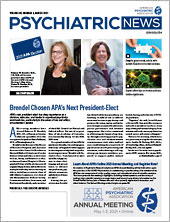For those of you who have already registered for APA’s online 2021 Annual Meeting, please do not miss “Latinx 2021: Solving the Dilemma.” For those of you who have not registered yet, then do so, and plan to add to your schedule this very relevant presentation.
We hope this symposium will expand the discussion about a central fact: that Latinx comprise the largest minority category in the United States, yet they continue to be underrepresented in mental health policy, psychiatric services, and psychiatric research.
This session should be of interest not only to Latinx psychiatrists, but also those who are not Latinx but practice in communities with Latinx patients. The session will also be of interest to those who have considered or have recently started practicing in Latinx communities.
As chair of this symposium, I first want to express my appreciation to the APA Scientific Program Committee members, who recognized the significance of this topic and included it in the meeting program. It has been a privilege to work with outstanding psychiatrists and colleagues in preparing this session, including Eugenio Rothe, M.D., Renato Alarcon, M.D., and Theresa Miskimen, M.D. After many years of successful work, they have built deep-rooted careers as clinicians, researchers, academicians, and leaders in psychiatry and issues pertinent to Latinx communities.
As a group, we have worked for months to prepare this presentation. The session has been carefully crafted to cover the important social determinants of the mental health of Latinx: education, migration, unemployment, and economic status, among others. We have included pertinent health issues such as metabolic diseases, psychiatric disorders, and cognitive syndromes as they are frequent and often disabling comorbidities among Hispanics. The session will also address important aspects of ethnicity; acculturation; and intergenerational factors and their different manifestations by age, gender, and family roles. And, of course, we will discuss the disproportionate impact of COVID-19 on Latinx communities during 2020 and 2021 and how it links to mental health issues. Special attention will be paid to differences between monolingual and bilingual speaking communities.
But the sessions will not be all about problems. My colleagues and I will explore areas of opportunity to enhance mental health, prevent mental illness, improve health literacy, and facilitate timely access to psychiatric treatment within Latinx populations. We also aim to discuss how we can mentor younger generations of Latinx medical students and psychiatry residents with the purpose of building a cadre of leaders for tomorrow. Program models that are already in the works will be presented so that they can be replicated and the presence of Latinx professionals can be enhanced.
So, do not miss the opportunity to listen to this and many other presentations that are part of the APA scientific program. See you online in May. ■
“Latinx 2021: Solving the Dilemma” will be held Sunday, May 2, from 2 p.m. to 3:30 p.m.

